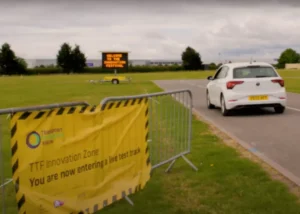A new project is getting underway to analyse the potential benefits of increasing connectivity and use of digital technology on local roads in England to create “digital roads”.
Digital Roads is a broad concept where increasing use of information technology, data and connectivity allows step-changes to the way roads are designed, built, managed and used.
The Digital Roads for Local Roads project aims to benefit the whole transport sector, local road authorities, and the Department for Transport (DfT) by providing a clear digital vision focussing on the needs and opportunities of local roads which can help inform future policy decisions and ultimately deliver better services and experience to road users.
The initiative engages with stakeholders through surveys, workshops and interviews to gather a wide spectrum of views from local authorities, professional bodies, academia, consultants and contractors.
While strategic roads authorities have worked on digital solutions for years, there has been less work done on the local network which makes up 97% of all roads in the country. The new Digital Roads for Local Roads project has been set up to change this. The project will provide a future vision and case for widescale digitalisation of local roads. This will help the Department for Transport and Local Authorities develop national and local policies and reach funding decisions for the next five years, as well as informing Local Highway Authorities and other stakeholders of the potential advantages that can be delivered through Digital Roads.
Digital Roads are capable of providing future services such as enhanced in-vehicle passenger information, traveller services and monitoring of the movement of people and goods with the potential to vastly improve transport planning and management. Done well, digital roads will transform services to the travelling public through more efficient road asset management and maintenance, improved traveller information and communication, and the enabling of connected and autonomous vehicles. They also have the potential to deliver wider community benefits such as enhancing adult social care, health, education and policing services by using the local road as an artery for sensors and connectivity, and reinvigorating high streets.
The project is being delivered through a number of specialist contributors including Ringway as a local and strategic highways provider, Vinci Highways, digital transportation solutions provider Jacobs, Ordnance Survey as mapping and data provider, with research and stakeholder engagement led by TRL. The team is working with Government, specifically the Department for Transport through the Transport Technology Forum, along with the Local Government Association of Directors of Environment, Economy, Planning and Transport (ADEPT), and Innovate UK.
“This is an exciting project that will allow local authorities and central government to work together harnessing the power of technology on our roads,” commented ADEPT President Mark Kemp. “The project will look at aspects around the meaning of digital roads in the context of a local authority road network, and the benefits and opportunities so that local highway authorities can start to plot their roadmap towards a digital road network.”
The project, which will deliver a report later in the summer, will provide a view of what a digital local road network in England could look like by 2030 and how local authorities can begin this journey. The report will set out the wider benefits of digitally-enabled roads for various stakeholders including users, residents, local businesses and the wider communities, considering potential needs and opportunities for the future. This will support Local Authorities, and their consultants and contractors, who manage and maintain these vital assets.
To take part the survey and provide views on the future of local roads, click here:
www.smartsurvey.co.uk/s/digitalroadsforlocalroadssurvey/
(Picture – TRL)























